Economy
8 suspects detained in Türkiye over alleged stock manipulation
Eight suspects have been detained in Türkiye over the alleged manipulation of stock prices on the Borsa Istanbul and causing financial losses to small investors, media reported on Monday.
The detentions came after the investigation by the Istanbul Chief Public Prosecutor’s Office found unusual price and volume volatility in shares traded on the stock exchange, specifically in the stocks of Atlantis Yatırım Holding A.Ş.
Eight individuals were taken into custody by the authorities in Istanbul, Kocaeli, Antalya and Zonguldak, the private broadcaster NTV reported.
The suspects are being investigated on charges of establishing a criminal organization and market fraud, Anadolu Agency (AA) said.
The case comes amid heightened scrutiny of financial crimes in Türkiye, where regulators have pledged to protect market stability and investors.
In early March, authorities detained 17 people suspected of causing “unusual movements” in the stock market and engaging in manipulative actions in capital market instruments.
The latest manipulated share activity centered on Atlantis Yatırım Holding, a firm that had already been under scrutiny in the watchlist market segment, where trading hours are limited due to risk concerns.
Following news of the investigation and arrests, Atlantis Yatırım Holding shares dropped by over 9.9%, to TL 51.25 on Monday.
The stock has seen wild price swings over recent years.
Once trading below TL 1, Atlantis shares began a meteoric rise in early 2020, reaching TL 10 by 2021. The rally gained momentum through 2022, peaking at TL 185 – a 4,500% increase over 15 months.
However, the stock later plunged, falling to around TL 40 by mid-2024. Despite being in the watchlist segment, it made another sharp climb to TL 124 between July and August 2024, marking a 210% gain within a month.
That second surge was followed by yet another steep decline, with the stock dropping to the TL 45 level before rebounding to TL 73 by June 11 of this year. It has since resumed a downward trajectory, closing at TL 56.90 on July 11.
Economy
July 15 ‘spirit’ seen as catalyst for Türkiye’s economic progress
Turkish economy management and the business community on Tuesday paid tribute to the nation’s resilience and unity, marking the anniversary of the defeated July 15 coup attempt, highlighting how the spirit of resistance has also become a driving force for the economy.
Tuesday marked nine years since the Gülenist Terror Group (FETÖ) and its U.S.-based leader Fetullah Gülen orchestrated the coup that left 251 people dead and thousands more injured. Gülen died in Pennsylvania, U.S., in October 2024.
Hundreds of companies were seized and handed over to the Savings Deposit Insurance Fund (TMSF) due to their links to FETÖ.
Business leaders emphasized that the coup attempt was thwarted by citizens from all walks of life uniting around the national will. That unity, government officials and industry leaders say, has since served as a powerful catalyst for rebuilding and strengthening the Turkish economy.
They commemorated heroes who gave their lives for the homeland, and extended gratitude and appreciation to veterans.
Industry and Technology Minister Mehmet Fatih Kacır described July 15 as the day the Turkish nation “declared to the world it would never submit to disgrace.”
“It is the name of the glorious resistance in which the Turkish nation stood up for its will, independence and future,” Kacır said. “The victory we achieved under the leadership of our President and Commander-in-Chief, Recep Tayyip Erdoğan, is a symbol of our nation’s unity and determination,” he added. “The name of the victory is Türkiye.”
‘Türkiye’s energy doesn’t bow to coups’
Agriculture and Forestry Minister Ibrahim Yumaklı echoed Kacır’s message, emphasizing the “courage and resolve” of citizens who confronted tanks and bullets in defense of democracy.
Trade Minister Ömer Bolat called the events of July 15 a “victory of resistance for freedom,” citing the unity between Erdoğan’s leadership and the people’s patriotic spirit.
He said the uprising left a sacred mark in history and sent a clear message that “no chains could bind the Turkish nation’s will.”
Energy and Natural Resources Minister Alparslan Bayraktar linked the spirit of July 15 to Türkiye’s ongoing pursuit of energy independence.
“Today, we continue to work with the same determination and spirit of July 15 to achieve full energy independence,” he said.
“Energy independence means a greater and stronger Türkiye. In this pursuit, we are tirelessly striving day and night to lead our country to energy sovereignty,” he added.
“Türkiye’s energy does not bow to coups.”
Major cost
Business representatives highlighted how the unity displayed on July 15 has translated into economic momentum and resilience over the past nine years.
Independent Industrialists and Businessmen’s Association (MÜSIAD) President Burhan Özdemir pointed out that what the Turkish nation protected by standing up for its will on July 15 was not only democracy, but also the Turkish economy.
Özdemir that the FETÖ terrorist organization sought to damage not only economic capacity but also poison human capital.
The coup attempt targeted a Türkiye that had paid off its IMF debt in 2013, achieved 27 consecutive quarters of growth, strengthened its financial and fiscal discipline and was preparing to launch many major projects, he noted.
“Although markets returned to normal shortly after July 15 thanks to successful economic policies, the coup attempt had significant costs,” Özdemir said. Initial estimates put the cost at around TL 300 billion, and considering its impact on sub-sectors, this figure likely increased further, he added.
Özdemir also emphasized a sharp rise in the exchange rate, market panic, and disruptions in production and economic activity further deepened the damage.
While the Turkish economy had grown by 4.5% and 4.7% in the first two quarters of that year, it contracted by 0.2% in the third quarter. It closed the 2016 with an annual growth of 2.9%.
All these costs, Özdemir said, have not overshadowed the economic gains achieved over the past two decades.
Istanbul Chamber of Commerce (ITO) President Şekib Avdagiç praised the Turkish people for rallying around Erdoğan and defending democracy. “The era of coups in Türkiye ended that night,” Avdagiç said, adding that people from all political backgrounds resisted with a collective heart.
Avdagiç warned of what could have happened had the coup succeeded: “Türkiye would have become a helpless country left at the mercy of those who want to reshape our region… Who would have stood up for Gaza, or said ‘stop’ in Syria?”
He emphasized that Türkiye’s economic recovery since then has been driven by national resolve: “We believe that the wheels of trade and economy turn with the winds of freedom.”
Seized companies’ performance
The number of FETÖ-linked companies run by the TMSF stands at 533, compared to 1,371 in the aftermath of the coup attempt, according to a report by the Turkish business daily Nasıl bir Ekonomi.
At the time of transfer, the combined asset size of the 533 companies was TL 35 billion. As of Dec. 31, 2024, this figure grew by 518%, reaching TL 229.5 billion.
Their total equity at the time of transfer was TL 12.7 billion. By the end of 2024, it had increased by 908%, reaching TL 128 billion, the report said.
The combined turnover of these companies reached TL 133 billion as of last year. These companies currently employ 21,976 people.
Mustafa Gültepe, head of the Türkiye Exporters Assembly (TIM), emphasized the role of production and exports in increasing national prosperity.
“This is why we approach production and exports with a sense of national duty. All our game plans and strategies are designed with the long-term goal of placing Türkiye among the world’s top 10 exporting countries,” Gültepe said.
“Of course, we know that reaching this goal is not easy. At times, global developments or domestic factors can slow our momentum.”
Türkiye reached record annual exports in 2023 and 2024, but Gültepe says they do not consider the growth in shipments sufficient.
“We started 2025 with an export target of $280 billion, and although we are 4.1% ahead compared to the same period last year in the first half of the year, we are still below the desired level,” he noted.
“For our medium- and long-term goals, we need to grow our exports by double-digit rates every year.”
Door to coups closed
Gültepe also stressed the importance of stability and predictability, suggesting that various attempts are made – both internally and externally – to try to destabilize Türkiye and disrupt the atmosphere in the country.
“On July 15, 2016, we faced one of those vile attempts. The coup attempt by a treacherous terrorist organization that infiltrated all state institutions – especially the Turkish Armed Forces, law enforcement, and judiciary – was thwarted by the resolute leadership of our president and the unwavering determination of our people, even at the cost of their lives,” said Gültepe.
“On that night, our nation declared loudly and clearly to both friends and foes that it would never allow another coup in Türkiye.”
Istanbul Commodity Exchange (ISTIB) President Ali Kopuz described the failed coup as a turning point.
“Thanks to the foresight and courage of our people, the door to coups in Türkiye is now closed,” he said. He warned, however, that threats will always remain and called for continued vigilance and excellence in every professional field.
“Therefore, while continuing the fight against the remnants of FETÖ, we must also remain constantly vigilant against all threats. By performing our work in the highest quality across the sectors we operate in, we must strive to build a stronger and more prosperous country.”
Economy
US inflation picks up in June as Trump’s tariffs begin to weigh in
U.S. consumer inflation picked up in June, in line with analyst estimates for the surge in costs, government data showed Tuesday, as policymakers try to gauge how President Donald Trump’s ever-growing list of tariffs is affecting the economy.
Observers are expecting to learn more about the effects of Trump’s duties over the summer months, meaning June’s data marks the start in a series of closely-watched figures – particularly as officials mull changes to interest rates as well.
The consumer price index (CPI) was up 2.7% from a year ago in June, rising from the 2.4% figure in May as energy costs rose, said the Department of Labor.
Other areas that saw cost increases included household furnishings and apparel, both segments that experts are eyeing for signs of cost hikes after Trump’s sweeping tariffs this year.
While Trump imposed a 10% tariff on almost all trading partners in April and separately slapped steeper duties on imports of steel, aluminum and autos, U.S. officials have pushed back against warnings that these could spark price increases.
Economists caution that tariff hikes could fuel inflation and weigh on economic growth, but U.S. Treasury Secretary Scott Bessent has labeled such expectations “tariff derangement syndrome.”
CPI rose 0.3% in June from the previous month, an uptick from the 0.1% increase in May as well.
Excluding the volatile food and energy segments, CPI climbed 0.2% month-on-month, picking up from May too.
Compared with a year ago, “core” CPI was up 2.9% in June.
Even if headline inflation figures show no “meaningful” surge because of tariffs alone, Nationwide economist Oren Klachkin warned it may be too soon to see their full impact just yet.
Businesses have been trying to hold off consumer price hikes through a range of actions, from eating into their own margins to trying to share costs with their suppliers, he said.
But it remains to be seen how long they can do this.
There could be a bigger impact over the summer, Klachkin added.
For now, he is looking “under the surface” at components most exposed to Trump’s tariffs, such as furnishings, recreational goods and cellphones, to discern their effects.
Besides steep tariffs that have already taken effect, Trump has also threatened even higher levels on dozens of key trading partners including the European Union, India, Japan and South Korea if they do not strike deals to avert these elevated levels.
He has also opened doors to further levies on sector-specific imports ranging from semiconductors to pharmaceuticals, injecting more uncertainty in the global economy and worries of supply chain snags.
Economy
For Europe, 30% US tariff would be game-changer
The 30% tariff on European goods threatened by U.S. President Donald Trump would, if implemented, be a major blow to Europe, potentially dismantling large segments of transatlantic trade and compelling the bloc to reassess its export-driven economic strategy.
European ministers meeting in Brussels on Monday remained convinced they can bring Trump back from the brink before his Aug. 1 deadline and reach a deal that would keep the $1.7 trillion two-way trading relationship broadly intact.
But the wild swings in Trump’s mood toward the European Union – which he has sometimes labelled as friendly and at other times accused of being set up specifically to destroy the United States – keep the 30% threat very much alive for now.
“It will be almost impossible to continue the trading as we are used to in a transatlantic relationship,” EU trade chief Maros Sefcovic said of the 30% rate before meeting ministers and officials of the 27 EU capitals to give them an update.
“Practically, it prohibits the trade.”
EU officials had been hoping they could limit the damage by agreeing on a baseline tariff of around 10% – the one currently in place – with additional carve-outs for key sectors like autos.
Last year, the United States accounted for a fifth of all EU exports – its largest partner. Trump’s bugbear is the $235 billion U.S. deficit generated by the goods component of that trade, even though the U.S. earns a surplus on services.
Upend policy plans
The impact of making European exports – from pharmaceuticals to autos, machinery or wine – too expensive to be viable for American consumers would be instantly tangible.
Economists at Barclays estimate that an average tariff rate on EU goods of 35% including both reciprocal and sectoral duties, combined with a 10% retaliation from Brussels, would shave 0.7 percentage points off eurozone output.
This would eat up most of the eurozone’s already meagre growth and likely lead the European Central Bank (ECB) to cut its 2% deposit rate further.
“Inflation would likely undershoot the 2% target more deeply, and for longer, prompting a more accommodative monetary policy stance – with the deposit rate potentially reaching 1% by (March 2026),” the Barclays economists said.
An earlier estimate by German economic institute IW found tariffs of 20% to 50% would cost Germany’s 4.3 trillion euro economy more than 200 billion euros between now and 2028.
While arguably small in percentage terms, that lost activity could still upend Chancellor Friedrich Merz’s plans to push through tax cuts and spend more on renewing the country’s long-neglected infrastructure.
“We would have to postpone large parts of our economic policy efforts because it would interfere with everything and hit the German export industry to the core,” Merz said at the weekend of a 30% rate.
Nowhere to run
Further down the line, it raises bigger questions over how Europe recoups the lost activity to generate the tax revenues and jobs needed to fund ambitions ranging from caring for ageing populations to military rearmament.
Under its existing policy of trade diversification, the EU has done well in striking preliminary deals with new partners but – as the continued delay over completion of the giant EU-Mercosur trade pact shows – it has struggled to get them fully signed and sealed.
“The EU does not have different markets to pull up to and sell into,” Varg Folkman, policy analyst at the European Policy Centre think tank, said of the long and complex timelines involved in classic free trade deals.
Some observers have argued the standoff with Trump is what the EU needs to complete long-delayed reforms of its single market, boosting domestic demand and rebalancing its economy away from exports, which account for around half of output.
The International Monetary Fund (IMF) has estimated the EU’s own internal barriers to the free flow of activity are the equivalent of tariffs of 44% for goods and 110% for services. Mooted reforms such as creating freer cross-border capital markets have made little headway in more than a decade.
“It is easier said than done. There isn’t an agreement to deepen. The barriers are imposed by the EU members themselves to benefit their own,” Folkman said of the web of national regulations.
How all this plays into the EU’s negotiating strategy in the less than three weeks ahead remains to be seen – but for now, the bloc has stuck to its line of being open to talks while readying retaliatory measures if they break down.
One thing that might persuade Trump to reach a deal, some European observers suggest, is that the lingering uncertainty may by itself push back the timing of the Federal Reserve (Fed) interest rate cut the U.S. president so desires.
“The latest developments on the trade war suggest that it will take more time to get a sense of the ‘landing zone’ on tariffs … which of course raises uncertainty for everyone, including the Fed,” AXA chief economist Gilles Moec said.
“With this new salvo … calls for cutting quickly get even harder to justify.”
Economy
Türkiye, Malaysia aim to strengthen cooperation in Islamic finance
Türkiye and Malaysia can and should work together in a time when the world is seeking more direction and clarity, the chairperson of a Malaysian center focusing on Islamic finance said in an interview published on Tuesday.
“Türkiye and Malaysia can and should work together in a time when the world is seeking more direction and clarity. We are in a phase where we must continue to build and strengthen our relations,” said Tan Sri Azman Mokhtar, the chairperson of Malaysia International Islamic Financial Centre (MIFC) Leadership Council (MLC).
Speaking to Anadolu Agency (AA), Mokhtar emphasized Türkiye’s significance, both in its region and globally, explaining that they aim to advance the strong economic, financial, and investment ties between Türkiye and Malaysia.
“The Future of Islamic Finance: Türkiye-Malaysia Business Forum” was held recently in cooperation with the Presidency’s Investment Office and MIFC MLC.
As part of the program, more than 20 senior financial representatives operating in areas such as Islamic banking, capital markets and takaful (Islamic insurance) came to Türkiye, along with heads of regulatory and supervisory institutions.
The program focused on promoting the Istanbul Financial Center (IFC), showcasing investment opportunities in Türkiye, strengthening public-private cooperation and evaluating investment prospects through one-on-one meetings.
Islamic finance, which has emerged in recent years as an alternative model, continues to grow and is expanding its influence, especially in the Gulf countries, Southeast Asia and Africa.
Due to its promotion of financial inclusion in developing countries and its foundation on ethical principles, Islamic finance is expected to become more widespread across broader geographies in the future. Türkiye stands out as a key part of this growing trend.
Legal reforms in participation finance, the establishment of new participation financial institutions, and the aim of turning Istanbul Financial Center into a global hub are all strengthening Türkiye’s Islamic finance ecosystem.
As of 2024, participation banking holds an 8.5% share in the country’s banking sector, and this is expected to reach double digits in the coming years.
Additionally, initiatives such as participation-based insurance, sukuk issuance (Islamic bonds) and the diversification of interest-free financial products support Türkiye’s goal of becoming a regional Islamic finance center.
In his remarks to AA, Mokhtar noted that trade between the two countries exceeds $5 billion (TL 200.87 billion), adding, however, that there is room to “grow this even further.”
“Our relationship is truly strong,” he said.
Mokhtar explained that in Malaysia, Islamic finance constitutes almost half of the banking system and two-thirds of the capital markets.
Highlighting Türkiye’s significance regionally and globally, Mokhtar added: “Malaysia currently holds the chairmanship of the Association of Southeast Asian Nations (ASEAN). Türkiye and Malaysia can and should work together in a time when the world is seeking more direction and clarity. We are in a process where we must continue to build and strengthen our relations.”
He also mentioned witnessing the development of the Istanbul Financial Center closely and recalled opening an office in Istanbul during his time as CEO of Khazanah Nasional to invest in Türkiye and the region, a branch that is still active today.
Moreover, he drew attention to Türkiye’s regional influence and its role in participation finance.
“Türkiye is not just about Türkiye. It is a bridge economy for Central Asia, Africa, the Middle East and North Africa. There is serious potential in the participation finance,” he remarked.
“Much of this potential is already being realized. As Malaysia, we will continue to be part of this bridge, just as we are in our own region,” he added.
Mokhtar emphasized that the global financial world is searching for direction, with ongoing issues and instability in monetary policy, climate initiatives, and environmental, social and governance (ESG) efforts.
He said that Islamic finance is rooted in social justice, and that they have transformed this tradition into a modern framework.
Highlighting the system’s growth potential, he added: “Islamic finance is growing much faster than the global financial system today, but in percentage terms, we are still relatively small. That means there is plenty of room for growth.”
Economy
Buoyed by exports, China’s economy expands 5.2% in Q2
China’s economy grew by more than 5% in the second quarter, despite global headwinds and tensions with the U.S., official data showed Tuesday, buoyed by strong exports, but analysts warned that more work was needed to address sluggish consumer demand.
The figures offer a rare bit of good news for the country’s leadership as it fights a multi-front battle to kickstart growth – a challenge made all the more difficult by U.S. President Donald Trump’s tariff war.
But the knock-on effects of the trade turmoil abroad and persistent sluggish consumption mean the economy could slump in the second half of year, analysts warned.
The U.S. president has imposed levies on China and most other major trading partners since returning to office in January, threatening Beijing’s exports just as it becomes more reliant on them to stimulate economic activity.
The two superpowers have sought to de-escalate their row after reaching a framework for a deal at talks in London last month, but observers warn of lingering uncertainty.
On Tuesday, Beijing’s National Bureau of Statistics (NBS) said the Chinese economy grew 5.2% from April to June, matching a prediction by an Agence France-Presse (AFP) survey of analysts and topping an official growth goal for the year set by the government.
But it marked a slowdown from the 5.4% seen in the first quarter, which was boosted by exporters rushing to shift goods ahead of swingeing U.S. tariffs kicking in.
“The national economy withstood pressure and made steady improvement despite challenges,” NBS deputy director Sheng Laiyun told a news conference.
“Production and demand grew steadily, employment was generally stable, household income continued to increase, new growth drivers witnessed robust development and high-quality development made new strides,” he said.
Markets were mixed in response – after a strong start to the day, Hong Kong pared an early rally while Shanghai dipped into negative territory.
“The figures probably still overstate the strength of growth,” Zichun Huang, China Economist at Capital Economics, said in a note.
“With exports set to slow and the tailwind from fiscal support on course to fade, growth is likely to slow further during the second half of this year,” Huang added.
Retail sales rose 4.8% on-year last month, below a forecast in a Bloomberg survey of economists, suggesting efforts to kickstart consumption have fallen flat.
The weak readings come as Beijing battles to shift towards a growth model propelled more by domestic demand than the traditional key drivers of infrastructure investment, manufacturing and exports.
Factory output, meanwhile, gained 6.8%, higher than the estimate – reflecting continued high demand for Chinese exports that has boosted growth.
‘More deflation’
But analysts warn that strong exports could be driving deflationary pressures and further dampening already sluggish consumer demand.
“Recent efforts to boost spending, such as the broadening of the consumer goods trade-in scheme earlier this year, did temporarily lift retail sales,” said Sarah Tan, an economist at Moody’s Analytics.
“However, this support proved unsustainable, with funding reportedly drying up in several provinces. The scheme’s limitations highlight the need for policymakers to address the deeper structural challenges behind consumer caution.”
Data last week showed consumer prices edged up in June, barely snapping a four-month deflationary dip, but factory gate prices dropped at their fastest clip in nearly two years.
“The economy posted a solid first half, supported by resilient exports, though this momentum is contributing to deepening deflationary trends,” Louise Loo, Head of Asia Economics at Oxford Economics, said in a note.
“The cost of strong exports is more deflation,” she said.
Disagreements also persist between Beijing and Washington, despite the framework agreement reached last month.
“We are resolved to handle our own affairs well,” The NBS’s Sheng said Tuesday, noting “high tariffs” and “pressure in the external environment”.
Yue Su, principal economist for China at the Economist Intelligence Unit, told AFP that Tuesday’s data demonstrated “notable resilience,” warning that “trade frontloading will overdraw demand for the second half.”
Economy
White House exploring authority to fire Fed’s Powell: Official
U.S. President Donald Trump could dismiss Federal Reserve (Fed) Chair Jerome Powell for cause if supported by evidence, White House economic adviser Kevin Hassett said on Sunday, noting that the Fed “has a lot to answer for” regarding cost overruns in the renovation of its Washington headquarters.
Any decision by Trump to try to fire Powell over what the Trump administration calls a $700 million cost overrun “is going to depend a lot on the answers that we get to the questions that Russ Vought sent to the Fed,” Hassett told ABC’s “This Week” program.
Vought, the White House budget director, last week slammed Powell over an “ostentatious overhaul” of the Fed’s buildings and answers to a series of questions about the $2.5 billion project. In a posting on social media platform X, he compared the project to France’s Palace of Versailles, with rooftop gardens, water features and “premium marble.”
Hassett’s comments confirm that the Trump administration is actively exploring the renovation costs and Powell’s testimony about the project as a possible avenue to try to fire the Fed chief well before his term as chair ends in May 2026.
Trump has repeatedly called for Powell’s resignation for failing to lower interest rates since Trump returned to office in January.
Vice President JD Vance piled on more criticism in a post on X on Sunday: “Fed has been totally asleep at the wheel. As President Trump says, they’re TOO LATE–both in fighting inflation during Biden and in lower rates now.”
Roof terrace no, asbestos yes
The Fed on Friday appeared to rebut some of Vought’s claims in a “Frequently Asked Questions” posting about the project, describing it as the first complete renovation of the buildings since their construction in the 1930s, including removing lead contamination and more asbestos than initially anticipated.
It shows pictures of leaky pipes and roofs and notes that costs have risen due to increased material, equipment and labor costs. It denied assertions that there were VIP dining rooms or elevators being installed.
The project will have a “green roof” using plants to help manage water runoff and aid with heating and cooling, as many other federal buildings have used for decades, but no terrace access.
“There are no new water features, there’s no beehives, and there’s no roof terrace gardens,” Powell told U.S. senators in testimony in June, denying excessive spending on the project.
Powell said the almost 90-year-old headquarters “was not really safe, and it was not waterproof,” while acknowledging cost overruns.
The Fed has said that the project, which includes upgrades to an adjacent building, will consolidate staff into a single campus and reduce off-site lease costs. As of February, a Fed Inspector General report estimated that costs had risen to $2.4 billion from an estimate of $1.9 billion two years earlier, a $500 million increase.
Authority debated
Asked if Trump had the authority to fire Powell, Hassett, whose name has emerged as a potential candidate to take over the Fed chair job, said: “That’s a thing that’s being looked into, but certainly if there’s cause, he does.”
Republican Representative French Hill, who chairs the powerful House Financial Services Committee, said Trump did not have the authority to fire the Fed chair, but Congress would continue to provide strong oversight of the central bank.
“Just because Congress created the Fed and that we believe that it should be independent in the setting of monetary policy, it doesn’t mean that it’s immune from criticism,” Hill told CBS’ Face the Nation.
“Every president since World War II has had choice words for the Fed chair when they’ve not been in sync with the direction of the president.”
Regime change
Separately on Sunday, Kevin Warsh, a former Fed Board of Governors member who is considered a potential candidate to replace Powell, said the U.S. central bank needs a “regime change” that goes beyond the chair position.
“The Fed has lost its way. It’s lost its way in supervision, it’s lost its way in monetary policy,” Warsh said in a Sunday interview on Fox’s Sunday Morning Futures program.
“We need regime change at the Fed, and that’s not just about the chairman. It’s about a whole range of people, it’s about changing their mindset and their models, and frankly, it’s about breaking some heads, because the way they’ve been doing business is not working.”
-
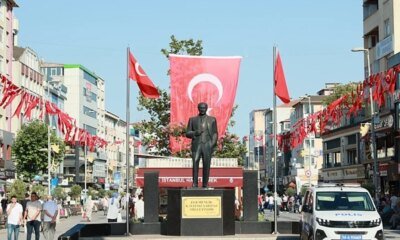
 Daily Agenda1 day ago
Daily Agenda1 day agoFlags are fluctuating for Türkiye without terrorism
-

 Sports1 day ago
Sports1 day agoConfusion hits as Trump joins Chelsea’s Club World Cup celebrations
-
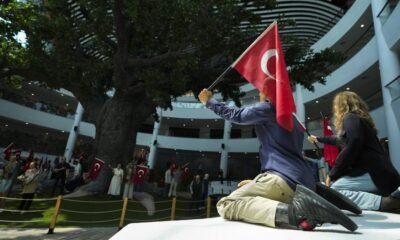
 Economy1 day ago
Economy1 day ago9 years on, business community salutes ‘inspiring spirit’ of July 15
-
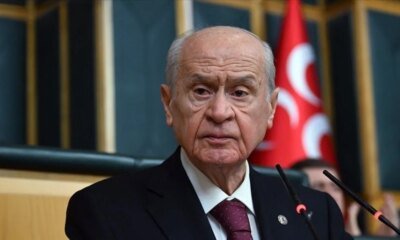
 Daily Agenda1 day ago
Daily Agenda1 day agoMHP leader Devlet Bahceli from July 15 Message: The head of the traitors was crushed
-
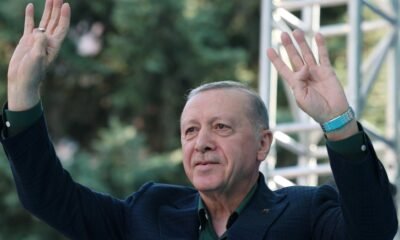
 Politics1 day ago
Politics1 day agoLeaders hail terror-free Türkiye success in phone calls with Erdoğan
-

 Economy1 day ago
Economy1 day agoSilver prices hit highest level since 2011 amid trade tensions
-

 Sports1 day ago
Sports1 day agoTurkish Sultans of Net to face Japan for Nations League semis spot
-
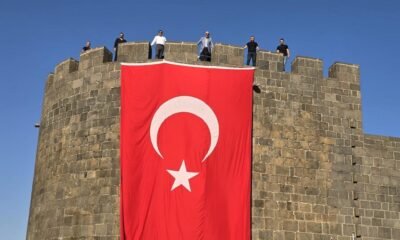
 Politics1 day ago
Politics1 day agoTürkiye welcomes PKK disarmament with flags, good wishes




